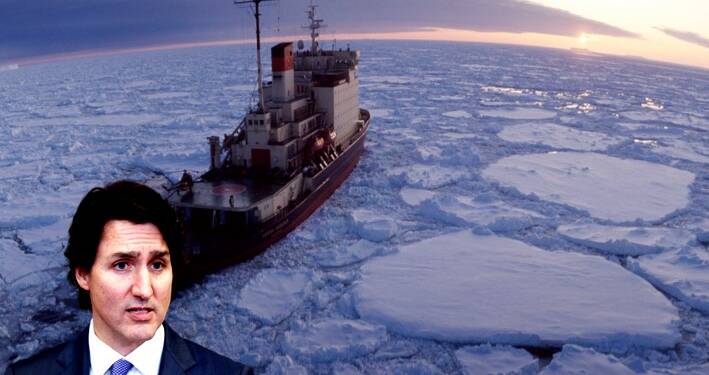There is a great game brewing in Canada’s backyard. A game to seize control of a crucial geopolitical region. The Arctic region. The Arctic region is home to abundant natural gas and oil resources and is developing into a key geopolitical battleground. The number of nations seeking to increase their influence in the region is growing. It won’t be long before the region becomes the next geopolitical hotspot, and it won’t be long before Canada’s own allies expand their tentacles there while Canada continues to watch.
There are eight nations that are located near the Arctic: Canada, the United States, Russia, Norway, Sweden, Finland, Iceland, and Denmark. All of them are allies of Canada. These allies are now calling to rethink their arctic relations as they are worried about an escalation in the region just like the war in Ukraine. Canadian peers are now planning to increase their military presence in the region.
Washington has now revised its Arctic strategy this month, which calls for a bigger military presence in the far north. The Finnish government published research last week on how the conflict in Ukraine affects its Arctic policy.
One of Denmark’s top foreign and security policy priorities is the Arctic. The most recent diplomatic and security policy strategy of the government includes certain noteworthy Arctic elements. Denmark has increased its military budget with a so-called ‘Arctic capacity package’ of approximately US$ 235 million with the aim to enforce its sovereignty and enhance surveillance in the Arctic.
Read More: The Arctic challenge that Canada has conveniently forgotten about
Meanwhile, in Ottawa, defence chief Gen. Wayne Eyre recently said, “We don’t see a clear and present threat to our sovereignty; not today, not this week, not next week, not next year,” he said.
“However, in the decades to come, that threat, that tenuous hold that we have on our sovereignty at the extremities of this nation, is going to come under increasing challenge.”
It’s good that the defence chief has realized this, though, as the race for the Arctic is real. So Why do countries want to claim the arctic region?
Controlling the Arctic is motivated by greed for money and resources. The Arctic land mass is believed to hold trillions of dollars worth of oil and natural gas, in addition to fisheries, rare earth minerals, gold, and diamonds.
Additionally, new shipping lanes will become available as the ice caps continue to melt. Instead of using the Suez Canal, shipping over the Arctic Ocean will save time and money. There are no shipping limitations in the Arctic Ocean like there are in canals, so when the ice melts, the opportunity increases. Major world powers will try to use the new resources to their advantage.
By 2040, the Arctic seas will be completely open due to the present rate of ice sheet melting. As a result, shipping times will occasionally be cut in half, substantially lowering the carbon footprint and reversing emissions.
Therefore, when this occurs, the nations that have already begun to increase their arctic ambitions will undoubtedly act aggressively in the future. Currently, Russia has the largest claim because it shares the largest coastline with the Arctic. Russia shares 53% of the Arctic’s coastline.
Even China is increasing both its activity and influence in the Arctic. As it advances a slate of economic, diplomatic, scientific, and military activities in the strategically significant geopolitical domain, China has turned into a silent but increasingly active actor in Arctic governance.
Where does Canada stand in this race?
Canada’s past and future are fundamentally tied to its sovereignty over the Arctic. The country has 162,000 km of the Arctic coastline. Forty per cent of Canada’s landmass is in the Arctic circle. Thus, it is crucial that Canada assume leadership in the area by making additional expenditures in both its energy infrastructure and its military capabilities.
Read More: Trudeau invites Putin to mount a military assault on Canada in the Arctic
However, Canada currently has a passive focus on the Arctic region. Critics of Canadian Arctic policy argue that Canadians’ safety is at risk if it does not step up to the plate and adequately defend. They say Canada is not ready for an offensive encounter in the Arctic. Even the Canadian military agrees that they are unprepared for any challenge, be it external or domestic.
The Arctic is destined to become a geopolitical flashpoint in the future, so Canada’s complacent approach will cost it dearly. The Canadian government is letting other players have an active presence in its backyard by not upping its game. If the pattern continues, Canada may lose the arctic to its own allies in the coming decade.
https://www.youtube.com/watch?v=07af0cq_aAo
